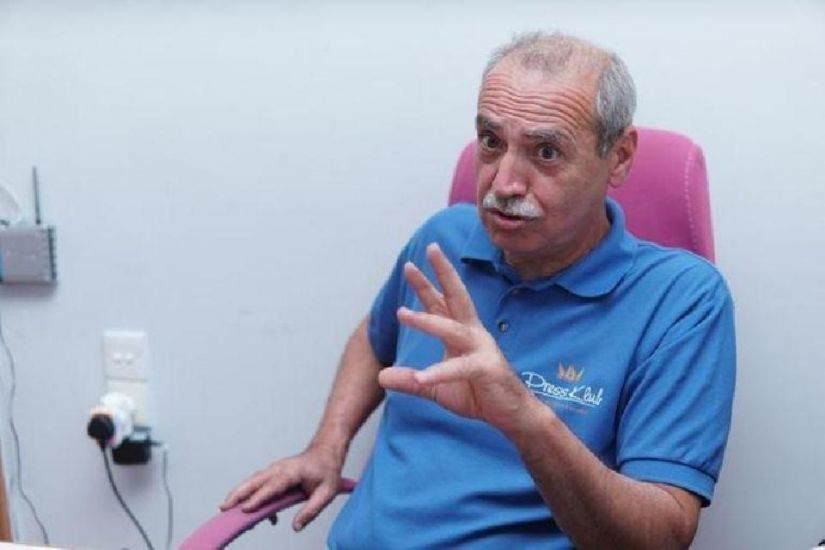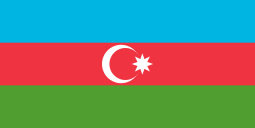
Arif Aliyev: "Our media is reminiscent of an open balloon released into the air"
22 July 2021
On the eve of National Press Day, a series of interviews on the situation of the press continues. This time, journalist, media expert, chairman of the New Generation Journalists' Union, Arif Aliyev, assessed the press day in response to ASTNA's questions.
Question: Arif bey, what is the situation of our press today?
Answer: It is in a chaotic situation. We divided the life of our media in the post-Soviet period into several stages: formation, development, stagnation, crisis. Now is the next stage - chaos. Our media is reminiscent of an open balloon released into the air: It is possible to trace its trajectory but it is impossible to predict it.
Question: Why hasn't the press day seen better days for years? What prevents this? Or who does not want the press to see better days in Azerbaijan?
Answer: In essence, the media is one of the branches of government in the state. Its unofficial status is as follows: "fourth power". In our reality, it has long been the sixth finger of the executive branch. Even the government does not know where to put this finger, how to hold it so that it does not look ugly. After Ali Hasanov, the leadership of the country's media policy - if it can be called "policy" - passed from hand to hand and continues to do so. Now at least three hands are playing at once. When I said they play, as in Ivan Krylov’s famous fable, each wants to gain control over it. Therefore, it has been a burden for years. It is a reason for the chaos.
Question: Are the press or journalists themselves trying to improve the situation of the media?
Answer: Since 2008, when we start counting from the infamous congress of the Press Council, there have been several such attempts which weakened gradually. It has not been possible until now and I do not believe that journalists will be able to make it possible at their own expense in the near future. As in an anecdote: With what? By what force? When you say "journalists", you mean a united and solidary group. You are right because if there is no unity, nothing will be possible. That is, if there is no courage and skill to use it, the tongue is only a piece of silent meat that knows the taste and hot and cold. I did not use the words "taste and hot and cold". Where are the 42 editors who went on a 3-day strike shoulder to shoulder 20 years ago for an editor who was unjustly harassed and whom they did not like? With some exceptions, they are in their places but sometimes they fight with each other on the trip, sometimes they come face to face in the offices of politicians. In any case, the subject of controversy is not "ways to improve the situation of the press."
Question: Now there are only a few independent media and journalists left that can be counted by fingers. Others have almost become reconciled with their fate. Why did they become reconciled with the situation, or what made them do it?
Answer: I can guess who you mean by the end of your question. When that person or such persons left office, hopes were revived, there was talk of deep reforms in the media. But as you see, one or two people don't solve anything. Others are now trying to implement the same ideas, the same methods. It is true that the system does not work as well as before but Mr. Hasanov did not suddenly become a "media boss" - experience is gained over time. At first, I saw that these "others" really want serious changes, they are taking concrete steps. Unfortunately, they stopped or were stopped. There was a lack of will, fear overcame uncertainty and the threat of losing control, they were wary of the wrath of an army of editors whose language was accustomed to the "taste".
As for those who reconcile with their fate, I do not consider this statement appropriate. Those who wanted to leave, or those who were forced to do so, left, and some of them continue to work there conscientiously and say their word. Others write denunciations of those left in the country to increase their value in foreign organizations, insult and swear at their opponents on the Internet. And they justify it by the injustice done to them. The damage they have done to this society and our media is no less than the damage done by the government. Whichever you dig, there are other interests and contacts with oligarchic groups.
The situation of journalists working in the country is not their fate. Fate falls like a stone on a person's head. Here we are talking about a wall built brick by brick by concrete people. One brick is unlimited power and a lack of real opposition, the second is a lack of legitimate parliament, the third is a lack of fair judiciary and the institution of independent lawyers, and the fourth is a lack of active non-governmental organization. I have named four main sources of information in journalism. If those sources are closed or do not work, journalism becomes churnalism. By the way, "churnalism" is not a joke, it is a copy-paste, so to speak, "second-hand" journalism, and today it is a term specific to at least 90% of the Azerbaijani media. Again, I will say: The mass media is like a bicycle, it should not stop; if it stops, it will fall. What will the media do to survive in the face of the collapse of sales networks and the collapse of the advertising market? It will either fall into the budget pot or into the pocket of the politician standing on the pot. Logic is a great force. For example, those who oppose it, as you say, "journalists counted by fingers", are heroes. The number of heroes in any stratum of society, including members of the media, can not exceed 1-2%. The other 98% cannot be blamed for following the logic of life. This is the case in all areas, whether media or non-media. Let's not add fate here and not associate God with our evil deeds. Or, should we call the teachers and doctors who go to the polling stations and throw fake ballots in the boxes "reconciled with their fate"?
Question: A new MEDIA agency has been established in Azerbaijan. Money has been allocated to the media in the name of development. A new bill is being prepared. Do you think that they serve or will serve to improve the situation of the media? Over the years, we have witnessed not the development of the media, but rather its decline. But where does that money go? Why don't those who allocate that money demand accountability, what has been done with these millions, and what are the positive results? Or are they satisfied with the situation? Maybe that's the goal?
Answer: We can create two MEDIA organizations and increase the money allocated to the mass media by four times, we can draft ten new, beautiful laws. We already had a beautiful law on freedom of information. When it came into force in 2005, it was cited in Europe as an example for other countries. What happened? Did it serve to improve the situation of the media? We also have a Chamber of Accounts. I don't think it works badly. In any case, it investigated the embezzlement in the State Support Fund for the Development of Mass Media, prepared a report, and asked the government to hold accountable the people it found guilty. Have our problems been over or are new ones added? MEDIA agency distributed money among Internet resources in the last competition. The form of "support" that was applied to the print media and allegedly “had us seen better days”, now applies to online media. Why was it necessary to dismiss Ali Hasanov? One of his greatest dreams was that! For years, he and the Press Council have been talking about a new law and the need to allocate money for online media.
Question: What would you suggest? What should be done so that the press sees better days? What steps should be taken?
Answer: When great thinker Akhundov was alive and was asked how he wanted to be buried, he said that it did not matter to the dead how the living would be saved from the suffering of the dead. When I am asked for a suggestion, that scene always comes to my mind. If it is a question of keeping media organizations dependent on the state body in any form, it does not matter to journalism. If we want to make progress, we must dismantle the wall that blocks the way forward. I said we must "dismantle" it, not tear it down, because it's not yet clear who will be under the avalanche. (Actually, I know). In my answer to one of the previous questions, I mentioned one of the main "bricks" of that "wall". Is it difficult? Of course, it is more difficult than distributing money and pre-holiday gifts to hungry mass media. But it is possible. By the way, in the expressions "situation of our press" and "situation of our media" in your questions, there is a reference to National Press Day. Happy holidays, journalists! Happy holidays, people! The press is the most perfect social institution in your history, created by the work of such heroes as Akhundov and Zardabi, who "did not become reconciled with their fate"! You need to protect it. This holiday is a special holiday. For the first time since the celebration of National Press Day, we will be able to observe it in the liberated Shusha!












